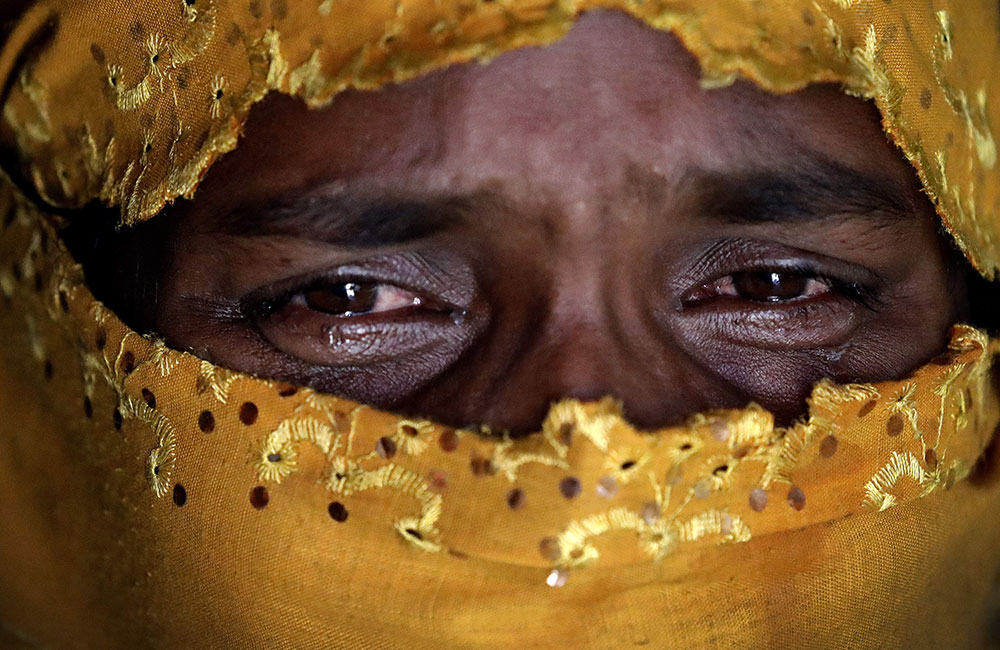UKHIA, BANGLADESH (AP): The newlyweds were asleep in their home in western Myanmar in June when seven soldiers charged in.
The woman, a Rohingya Muslim who agreed to be identified by her first initial, F, knew enough to be terrified. She knew the military had been attacking Rohingya villages, as part of what the United Nations has called ethnic cleansing in the mostly Buddhist nation. She heard just days before that soldiers had killed her parents and that her brother was missing.
Now they had come for her. The men bound her husband with rope, and tied her scarf around his mouth. They yanked off her jewelry and tore off her clothes. They threw her to the floor.
And then, she says, the first soldier began to rape her.
She struggled against him, but four men held her down and beat her with sticks. Her husband finally wriggled the gag out of his mouth and screamed.
And then she watched as a soldier fired a bullet into the chest of the man she had married only one month before. Another soldier slit his throat.
Her mind grew fuzzy. When the soldiers were finished, they dragged her outside and set her bamboo house ablaze.
It would be two months before she realized her misery was far from over: She was pregnant.
The Associated Press reported this story with a grant from the Pulitzer Center on Crisis Reporting.
The rape of Rohingya women by Myanmar's security forces has been sweeping and methodical, the Associated Press found in interviews with 29 women and girls who fled to neighbouring Bangladesh.
These sexual assault survivors from several refugee camps were interviewed separately and extensively. The women gave AP their names, but agreed to be publicly identified only by their first initial, citing fears they or their families would be killed by Myanmar's military.
They ranged in age from 13 to 35, came from a wide swath of villages in Myanmar's Rakhine state and described assaults between October 2016 and mid-September.
Yet there was a sickening sameness to their stories, with distinct patterns in their accounts, their assailants' uniforms and the details of the rapes themselves.
The testimonies bolster the U.N.'s contention that Myanmar's armed forces are systematically employing rape as a "calculated tool of terror" aimed at exterminating the Rohingya people. The Myanmar armed forces did not respond to multiple requests from the AP for comment, but an internal military investigation last month concluded that none of the assaults ever took place.
When journalists asked about rape allegations during a government-organized trip to Rakhine in September, Rakhine's minister for border affairs, Phone Tint, replied: "These women were claiming they were raped, but look at their appearances — do you think they are that attractive to be raped?"
Doctors and aid workers, however, say they are stunned at the sheer volume of rapes, and suspect only a fraction of women have come forward. Medecins Sans Frontieres doctors have treated 113 sexual violence survivors since August, a third of them under 18. The youngest was 9.
Each woman interviewed by the AP described attacks that involved groups of men, often coupled with other forms of extreme violence. Every woman except one said the assailants wore military-style uniforms, generally dark green or camouflage. The lone woman who described her attackers as wearing plain clothes said her neighbors recognized them from the local military outpost.
Many women said the uniforms bore various patches featuring stars or, in a couple cases, arrows. Such patches represent the different units of Myanmar's army.
Though the scale of these attacks is new, the use of sexual violence by Myanmar's security forces is not. Before she became Myanmar's civilian leader, Aung San Suu Kyi herself said Myanmar's armed forces used rape as a weapon to intimidate ethnic nationalities.
Yet Suu Kyi's government has not only failed to condemn the recent accounts of rape, it has dismissed the accounts as lies. In Dec. 2016, the government issued a press release disputing Rohingya women's reports of sexual assaults, accompanied by an image that said "Fake Rape."
Pic Caption: In this Tuesday, Nov. 21, 2017, photo, K, 25, right, cries as she recounts being gang raped by members of Myanmar's armed forces during an interview with The Associated Press in her tent in Kutupalong refugee camp in Bangladesh (AP File Photo)

Leave your comments
Login to post a comment
Post comment as a guest